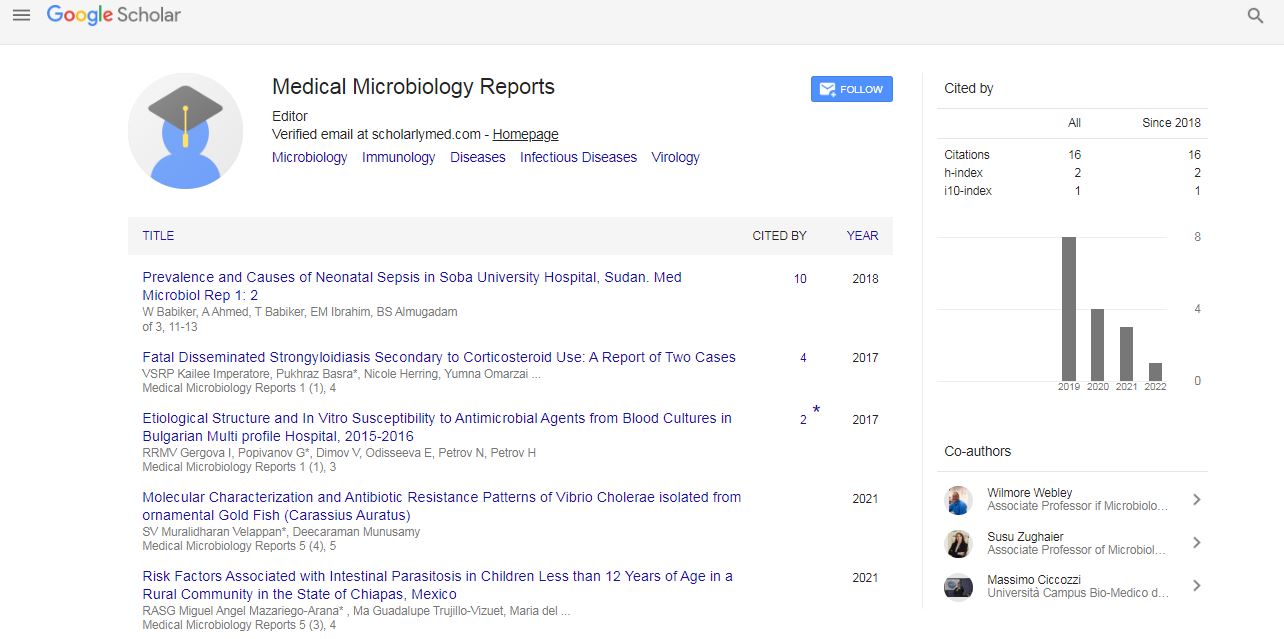Perspective, Med Microbiol Rep Vol: 7 Issue: 1
The Importance of Genetic Information in Microbes
Kayla Platt*Department of Epidemiology, University of Michigan, Ann Arbor, USA
*Corresponding Author: Kayla Platt
Department of Epidemiology
University of
Michigan, Ann Arbor, USA
Email: plattkayla@gmail.com
Received date: 27 February, 2023, Manuscript No. MMR-23-97289;
Editor assigned date: 01 March, 2023, PreQC No. MMR-23-97289(PQ);
Reviewed date: 15 March, 2023, QC No. MMR-23-97289;
Revised date: 22 March, 2023, Manuscript No. MMR-23-97289(R);
Published date: 31 March, 2023 DOI: 10.4172/MMR.1000334.
Citation: Platt K (2023) The Importance of Genetic Information in Microbes. Med Microbiol Rep 7:1.
Description
Microbes are tiny organisms that are ubiquitous in nature and have a significant impact on our lives. They can be found in various environments, including soil, water, and air, and are crucial for maintaining the balance of ecosystems. Moreover, some microbes play essential roles in human health, such as in digestion, immune system function, and even the production of certain medicines. In this context, genetic information plays an important role in understanding the biology of microbes and their interactions with the environment and other organisms.
Microbial genetics
Microbial genetics is the study of the genetic material of microbes and how it is expressed. Microbes contain DNA, which is organized into chromosomes or plasmids. These genetic elements carry the instructions that determine the traits of the microbe, such as its morphology, physiology, and behavior. By studying the DNA of microbes, scientists can identify the genes that are responsible for these traits and understand how they are regulated and expressed.
Role of genetic information in microbial ecology: Microbial ecology is the study of the interactions between microbes and their environment. Microbes are essential players in biogeochemical cycles, such as the carbon and nitrogen cycles, and have a significant impact on the ecology of their respective environments. By studying the genetic information of microbes, scientists can gain insight into their metabolic pathways and how they contribute to these cycles. Moreover, genetic information can help identify the mechanisms by which microbes interact with other organisms, such as in symbiotic relationships or pathogenic infections.
Biotechnological applications of microbial genetics: Microbes have been used extensively in biotechnology for various applications, such as in the production of antibiotics, enzymes, and other useful compounds. Genetic information plays an important role in these applications, as it enables scientists to manipulate the genetic makeup of microbes to enhance their productivity or alter their properties. For example, genetic engineering techniques can be used to introduce genes that code for the production of a desired compound into a microbe's genome. Furthermore, genetic information can help identify the enzymes and metabolic pathways involved in the production of a particular compound, which can facilitate its optimization and scale up.
Medical applications of microbial genetics
Microbes can have both beneficial and harmful effects on human health. While some microbes contribute to the well-being by aiding in digestion and producing essential vitamins, others can cause infections and diseases. Genetic information can help identify the genes and mechanisms by which microbes cause disease, which can aid in the development of treatments and vaccines. For example, genetic information has been used to develop diagnostic tests for infectious diseases and to design drugs that target specific bacterial or viral genes.
Genetic information plays a crucial role in understanding the biology of microbes and their interactions with the environment and other organisms. By studying the genetic makeup of microbes, scientists can gain insight into their metabolic pathways, interactions, and potential applications. Furthermore, genetic information can facilitate the development of biotechnological and medical applications that rely on the manipulation of microbial genetics. As such, continued research in microbial genetics will be vital for advancing our understanding of the microbial world and its impact on human health and the environment.
 Spanish
Spanish  Chinese
Chinese  Russian
Russian  German
German  French
French  Japanese
Japanese  Portuguese
Portuguese  Hindi
Hindi 
